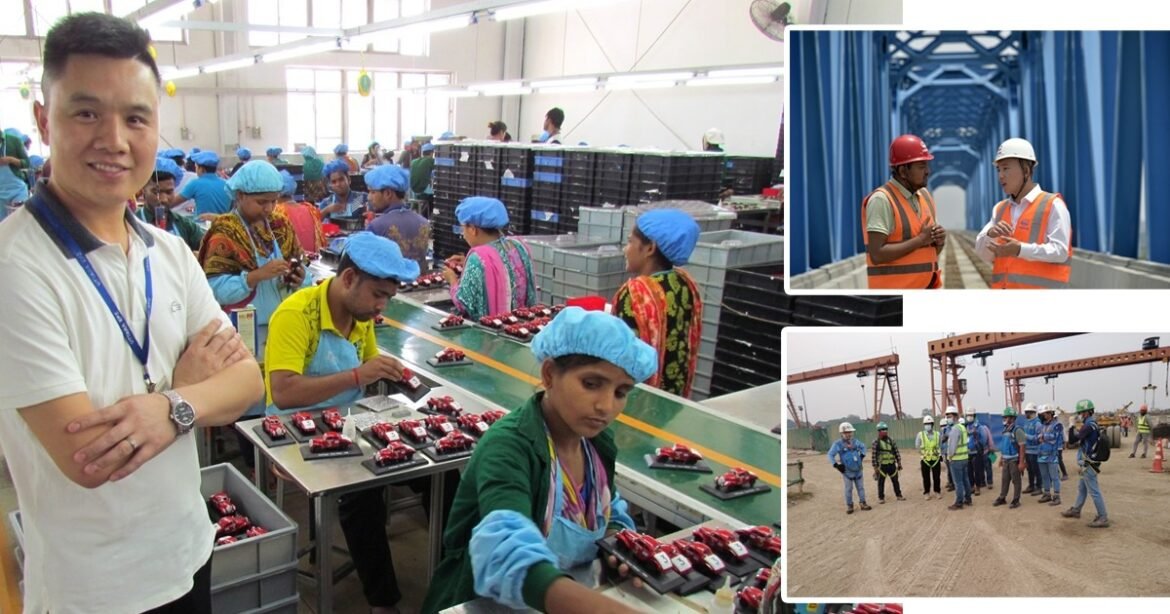Currently, there has been an increase in the number of foreigners in senior and managerial positions, citing the inability of the education system to produce a competent workforce as the reason.
In recent years, Bangladesh has seen a significant increase in the number of foreign nationals coming to the country to work, predominantly as a result of the expansion of industrial activities. This development demonstrates the increasing significance of the industrial sector, primarily manufacturing, to the economic expansion of the nation. However, it also sheds light on the inadequacies of the education system in producing the skilled personnel required to sustain this economic growth.
Growing industrialization and demand for skilled workforce
Bangladesh has maintained a commendable development rate of more than 6 percent over the past decade, with the industrial sector playing a crucial role in contributing to the country’s Gross Domestic Product (GDP). This transition from an agrarian-based economy to an industrial hub has created a demand for skilled laborers, particularly at the upper and middle levels of management.
In order to satisfy this demand, the Bangladesh Investment Development Authority (BIDA) has issued a significant number of work permits to foreign nationals. In the fiscal year 2021-22 alone, BIDA approved 15,128 work permit applications, an increase of 87.32 percent from the previous year. These applicants originated from 106 countries and were predominantly involved in industrial projects, commercial offices, and other organizations registered with BIDA.
Foreign nationals engaged in various sectors in Bangladesh
According to Home Minister Asaduzzaman Khan, there are presently 20,988 foreigners working in Bangladesh, the majority of whom are from China, followed by India. These individuals hold work permits from 115 countries and are involved in numerous development initiatives, industries, non-governmental organizations, and other job sectors.

According to the statistics, there are 6,075 foreigners from China and 5,876 from India working in Bangladesh, making them the two largest categories of foreign nationals. In addition, there are 2,468 individuals from Russia, 1,246 individuals from Sri Lanka, 924 individuals from South Korea, 557 individuals from Japan, 416 individuals from Pakistan, 460 individuals from the Philippines, 399 individuals from Thailand, 378 individuals from Belarus, 269 individuals from Kazakhstan, 168 individuals from the United States, 123 individuals from Malaysia, and 108 individuals from Indonesia working in the country.
Skills shortage and preference for foreign nationals
Industry insiders disclosed that the majority of foreign nationals employed in Bangladesh are from industrialized nations or nations with considerable industrialization experience. Countries such as India, Pakistan, Turkey, Taiwan, and Japan have a long history in the textile and garment industry, and many graduates possess the skills that Bangladeshi industries seek.
In Bangladesh’s apparel industry, the second-largest garment supplier in the world, the predilection for foreign nationals is particularly pronounced. Companies frequently employ foreign nationals for mid-level positions in the apparel industry, citing a lack of qualified local candidates for specialized roles such as merchandisers, technicians, researchers, and quality controllers.
Locals are concerned about the presence of foreign employees in a variety of industries, especially in the apparel industry. Some argue that foreign workers should only be employed in sectors where Bangladesh lacks skilled labor, and not in fields where competent locals are readily available.
The garment industry, which is a significant contributor to Bangladesh’s economy, has employed foreigners in technical and managerial positions, citing a dearth of qualified locals. However, critics question why skilled Bangladeshi executives are not leading local companies, particularly since Bangladeshi professionals have successfully secured top positions at multinational firms.
Impact of foreign workers’ remittances transfer on Bangladesh’s economy
The influx of foreign employees in Bangladesh has raised concerns about the outflow of money from the country’s economy. With a substantial number of foreign nationals working in various sectors, there is a significant remittance of earnings abroad. Experts estimate that these foreign workers repatriate a substantial amount of money annually, exceeding billions of dollars. This continuous financial outflow poses challenges for the country’s economy, as it reduces the overall financial resources available for domestic investment and development. Additionally, it highlights the need for a closer examination of the local labor market’s skill levels and the potential impact on the country’s economic growth.
Challenges in the education system
Despite the availability of a large labor force, the local labor market is perceived to have a skills imbalance. Some experts suggest that the education system should prioritize enhancing the skills of Bangladeshi professionals so that they are more employable in both domestic and international industries. The dearth of skilled personnel at the managerial and technical levels presents obstacles for industries that require specialized knowledge.
Abdullah Al Mahmud, chairman and managing director of Mahin Group, asserted that many students who graduate from elite universities, such as Bangladesh University of Engineering and Technology, seek employment abroad rather than in the country’s factories.
“On the other hand, skilled foreign nationals reside on the factory premises and render services whenever required.”
A call for improved education and regulation
Gathering precise information about the count of foreign nationals employed in different industries and incorporating them into the national tax system is crucial to uphold fairness and ensure adherence to tax regulations
Focusing on education and skill development is imperative for addressing these challenges and fostering sustainable economic growth. Government, educational institutions, and industries must collaborate to improve the quality of education and ensure that graduates are equipped with the necessary skills and knowledge for the job market.
While foreign professionals can contribute to Bangladesh’s economic development, it is essential to maintain transparency in the hiring process and regulation of foreign employees. It is necessary to collect accurate data on the number of foreign nationals employed in various industries and to bring them under the national tax framework to ensure fairness and compliance. By investing in education and skill development, Bangladesh can cultivate a competent and skilled labor force capable of meeting the expanding industrial sector’s demands.
To conclude, the rise in the number of foreign workers in Bangladesh highlights the growing demand for skilled professionals in the expanding industrial sector. However, it also underscores the need for the country to focus on improving its education system to produce a competent local workforce.


